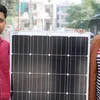Here's how this entrepreneur helped his family business transition to solar energy space
ICON Solar-en Power Technologies manufactures solar photovoltaic modules. It counts the State governments of Rajasthan and Andhra Pradesh, as well as L&T as clients.
Tarang Khurana is not your regular 27-year-old who took over a family business because he had exhausted all other options. No, his move was timely and made sense to the business as it looked to phase out the old and conquer new frontiers.
After a brief stint in advertising and sales promotion, Tarang returned to his hometown, Raipur, Chhattisgarh, and started preparing for civil services. The family business in the automobile and mining sector was running successfully until they decided to enter the energy space six years ago.
A small supply order for a project came up at that time, which was seeing the solar energy space becoming more prominent. And what started as an initiative to diversify has become the core focus of the group today.
A year into the transition, Tarang took over the reins of the company. The business became ICON Solar-en Power Technologies in 2014 to manufacture solar photovoltaic modules. In its sixth calendar year, the company is clocking a turnover of over Rs 100 crore. It has a manufacturing unit in Raipur which is also the headquarters and several others are spread across the country.

Manufacturing unit
Tarang, Director at ICON Solar-en Power Technologies, says, “Till about a year back, we were the only company in the entire central area, ie., within the Chhattisgarh and Madhya Pradesh region, to manufacture solar PV modules.”
ICON Solar-en Power Technologies was started with a 25MW commission capacity. Today, it has grown to 125MW and supplies to 16 states across India. Larsen and Toubro (L&T), and the State governments of Andhra Pradesh and Rajasthan are some of the company’s prominent clients.
A capital-intensive sector
Tarang points out the complexity in manufacturing solar PV panels, which are heavily engineered products.
“The modules produced by the company come with a 25-year power generation warranty,” he explains, adding that the products are manufactured according to the quality standards set by the Ministry of New and Renewable Energy as well as international engineering standards.
“All the equipment and machinery are imported from abroad, including countries like China, Taiwan, Italy among others,” he adds.
The power sector is a capital-intensive industry that has a long gestation period. This is the most challenging part for Tarang as an energy entrepreneur. “The cost of procurement of raw materials is very high, which makes it a risky territory to venture into.”
Good cash flow management and a little bit of relief on the logistics part has made it easier to run the day-to-day operations for ICON Solar. This is possible because of the company’s strong customer base, and location of its manufacturing unit, which cuts transport costs.
Tarang notes that automating workflows too has enabled the company to cut down on costs.

Manufacturing unit
Of challenges
While India still has to make many strides in the renewable energy sector space, government incentives and subsidies have helped companies like ICON Solar, Tarang says, especially in the first few years of setting up the business.
ICON Solar was started with a mix of owner’s capital and bank loans. Tarang, however, believes that banks need to embrace manufacturing companies more. This lack of support may be because “the project developers in the sector bring in more money compared to manufacturers like us.”
Goldman Sachs-backed ReNew Power is a prominent example of project developers for solar energy, whereas Saatvik Green Energy, Vikram Solar, and Adani Solar are all energy manufacturers.
Tarang cites ‘lack of knowledge and awareness’ as the prime reasons for the slow adoption of solar energy in India. While the government is driving adoption there are, nevertheless, some gaps that need to be fulfilled.
“You hear about the government encouraging the installation of solar farms or solar home light systems but you rarely hear it urging people to install solar on their rooftops or on the other spaces,” he says.
The entrepreneur adds that policies with respect to general public adopting solar energy have not been consistent and there has also been a lot of conflict between distribution companies and renewable energy companies. With a focused agenda, the government can remove a lot of creases in the system.
The sector is small but Tarang hopes that more people adopt solar energy, thus helping widen the market. He says, “People are looking at ways to be smarter about their energy consumption, and solar energy is the direct solution.”
Pertaining to ICON, the young entrepreneur has managed to bring in automation and make seamless operations at their manufacturing unit.
Expansion is on the cards for this solar manufacturing company, which intends to up its capacity to 200MW in the coming years. Tarang adds that work is in progress to kick-start a solar cell manufacturing line as well.
(Edited by Evelyn Ratnakumar)





1563874718888.png?mode=crop&crop=faces&ar=16%3A9&format=auto&w=1920&q=75)



